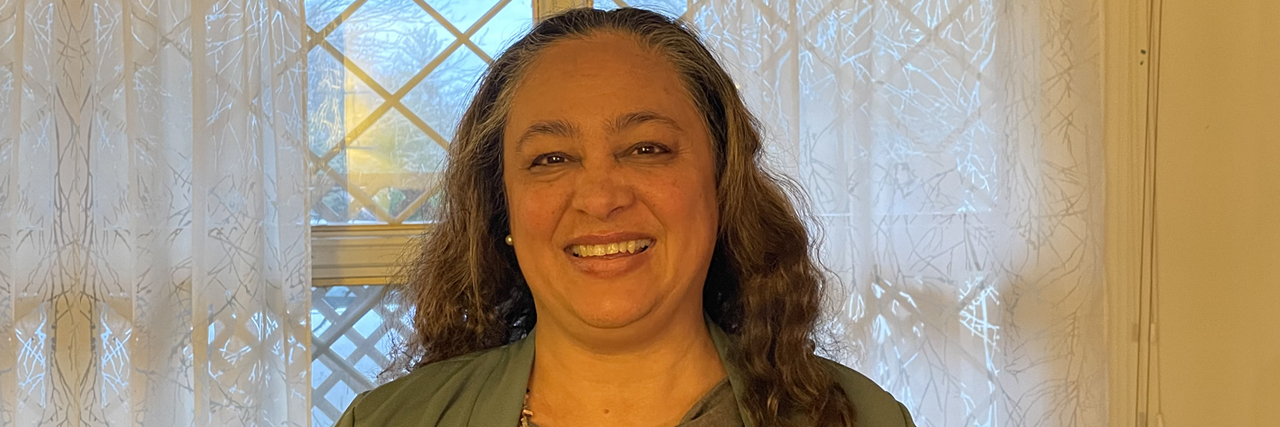Meera was at the peak of her Broadway career when she was diagnosed with schizophrenia. Now, 25 years later, as she looks back at her journey and how her perspectives on schizophrenia, treatment, and her relationships have evolved, she’s sharing her story to help show others they are not alone.
We recently spoke with Meera to learn more about her journey with schizophrenia from diagnosis to treatment, and how finding the appropriate treatment plan for her has positively impacted her life.
- Can you share a little about the time leading up to your schizophrenia diagnosis?
Before my schizophrenia diagnosis, I was at the top of my Broadway career. I was touring internationally, starring in high-profile productions. I lived for the “glitz and glamour” that came with my career but noticed that I would occasionally feel unexplainable bouts of nervousness. It would go away with deep breathing, and, at the time, I didn’t think much of it.
Around the time of my diagnosis, I was starring in a show in Las Vegas. Everything was going great, but my boyfriend noticed that my behavior seemed a bit odd, like I had started having conversations with the television. He suggested that we go see a psychiatrist.
The psychiatrist diagnosed me with schizophrenia when I was 31.
- How did you feel about your diagnosis? What has your treatment journey been like?
I had never heard of schizophrenia before. It was all new to me, and I didn’t know if it was good or bad, or even if it was permanent. When my doctor first prescribed me medication, I remember sitting on my bed and tossing it flippantly, not thinking I needed it. I was unmedicated for the first year of my diagnosis and watched my life start to unravel. I did not know the journey that was ahead of me.
Around this time, my grandma passed away, and, given my diagnosis, my parents insisted I move home to Indiana. We fought and fought. They tried to convince me I had schizophrenia, but I was in denial and rejected the whole thing. I was totally shocked that they wanted me to be on medication. In my mind, being medicated represented being sick—not participating in shows, not acting “normal”—and instead represented experiences with ambulances and hospital visits. All I knew was that theater, this ball that I had rolling my whole life, was no longer rolling. The ball had been dropped, and I watched my career slowly start to slip away. I lost my job, my house, and my boyfriend, and suddenly my life became filled with more hospital visits, more fear, and more hurt.
My parents were big advocates for medication, while I was adamant that I didn’t need treatment. What I didn’t know is that actually taking medication, and following your treatment plan are what help you get your symptoms under control and get you back to your version of “normal.”
It took me learning the hard way that I needed to accept my diagnosis. I made the switch to a long-acting injectable (LAI) medication, and, once on a treatment plan that worked for me, everything started to turn around. I saw the reward that came along with being compliant, and I was determined to control my symptoms. Over time, with my symptoms under control, I began to land a few jobs, write books, and became involved with music and advocacy organizations. My relationship with my parents also improved when I was compliant, and having this strong support system has helped me understand the benefits of remaining adherent with my LAI medication.
Today, I have strong support and treatment teams, including my family, friends, and nurses. Having this bond with my support and treatment teams has helped me feel comfortable and at ease with taking my medication as prescribed—it’s low maintenance and something I barely need to think about.
- You have already accomplished so much. What other goals do you have for yourself, and what are you looking forward to in your future?
I’m in a big transition period right now—my daughters are growing up, and I’m in that stage of my life where I’m preparing to be an “empty nester.” My children’s future is so important to me, and what I’m looking forward to most is watching them grow up and their journey along the way. Because I don’t need to take my schizophrenia medication every day and my symptoms are under control, I feel like my mental health condition has really taken a back seat and hasn’t hindered my life as a mother, wife, teacher, or friend.
Right now, I guest teach and, in the future, I might get my master’s or teaching license and become tenured. I don’t see myself going back on Broadway, but I do have plans to participate in my local theater company. My husband and I are also very excited to travel more.
I would also eventually like to do more writing. I’ve written a few books and may change one that I wrote about my journey with medication. It is a noncompliant story from my earlier years when I was newly diagnosed and struggling to accept that I needed to follow my treatment plan. I want to change the ending and share my experience to show everything I was able to accomplish after finding the right medication and the right treatment plan for me. I hope my story will prevent someone from learning the importance of following a treatment plan the hard way, as I did.
Every story is unique. If you are an adult living with schizophrenia, talk to your doctor to figure out a treatment plan that’s right for you.
Meera has partnered with Janssen Pharmaceuticals, Inc., to share her story. She has been paid an honorarium for her time.


